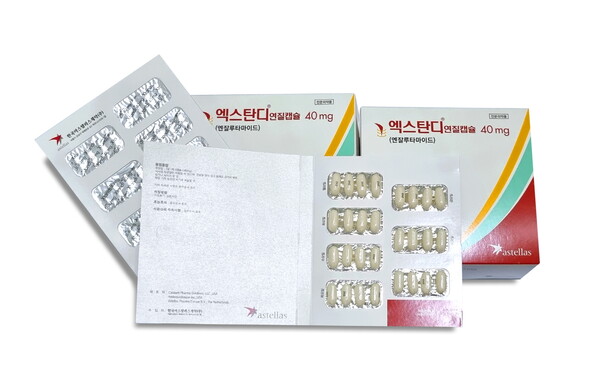
Prostate cancer drug Xtandi (enzalutamide), in combination with androgen deprivation therapy (ADT) to treat patients with metastatic hormone-sensitive prostate cancer (mHSPC), will see its reimbursement status change from selective to essential starting next month.
After winning approval for treating metastatic castration-resistant prostate cancer (mCRPC) in 2013, Xtandi was also approved to treat high-risk, non-metastatic castration-resistant prostate cancer. In September 2021, an indication was added to treat all patients with mHSPC, allowing the drug to be used in all stages after recurrence.
Astellas Pharma Korea said Tuesday that Xtandi, an androgen receptor antagonist (ARTA), will receive reimbursement as a combination therapy with androgen deprivation therapy (ADT) in treating patients with mHSPC starting next month.
Xtandi, combined with ADT for treating mHSPC patients, received selective reimbursement in August last year. With the latest expansion, however, it will get essential reimbursement in which patients’ out-of-pocket payments will be lowered to 5 percent, sharply increasing patient access.
The coverage expansion is based on the global phase 3 ARCHES study, which demonstrated a significant reduction in the risk of disease progression and death with the combination of Xtandi and ADT in men with metastatic hormone-sensitive prostate cancer.
The Xtandi plus ADT arm demonstrated a 61 percent increase in radiographic progression-free survival (rPFS) compared to placebo plus ADT, a significant improvement.
In addition, patients receiving Xtandi plus ADT did not reach a median rPFS, while that for the control group was 19 months, also confirming significant improvement.
"When the disease progresses from the mHSPC stage, it is difficult to expect a complete cure, and life expectancy drops dramatically, so early treatment strategies to prevent the disease from progressing as much as possible are crucial," said Kim Choung-soo, head of the Prostate Cancer Center at Ewha Womans University Mokdong Hospital. "With the essential coverage of Xtandi, we hope to contribute to the improvement of treatment outcomes for more Korean patients with metastatic prostate cancer through aggressive early treatment."
Astellas Pharma Korea General Manager Kim Jun-il said, "We are very pleased that Xtandi, which celebrated its 10th anniversary of the domestic launch this year, has been approved for mandatory coverage for mHSPC patients and reduced drug prices, contributing to health insurance financial savings and reducing the burden on patients with limited treatment options."
The company will continue to do its best to improve the treatment environment for prostate cancer patients with Xtandi, he added.

